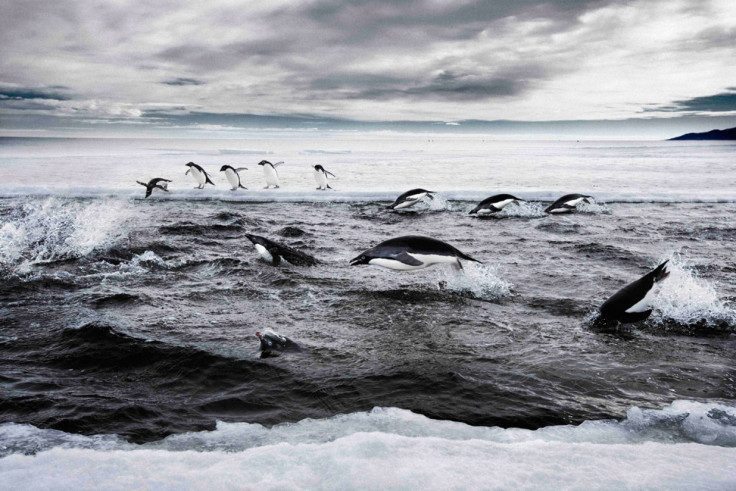Antarctica May Get World’s Largest Marine Protected Areas After Meetings This Week

Members of 24 nations and the European Union will meet in the German seaport of Bremerhaven this week to discuss the fate of two marine protected areas, or MPAs. Either one would be the world’s largest, and both would protect the waters off Antarctica from industrial fishing. It’s only the second time the Commission for the Conservation of Antarctic Marine Living Resources, or Ccamlr, has gathered outside its normal schedule in its 32-year history, and by the end of the meetings on July 16, the team could double the amount of protected area in the world’s oceans.
The Hobart, Tasmania-based Commission, which grew out of an international convention in 1982 to conserve Antarctic marine life, called the special meeting this July to go over revised proposals for the two sanctuaries after initial talks last October failed to end in a required unanimous agreement.
“The world has been watching Ccamlr this year in order to ensure it would agree on significant Antarctic marine protection, but all they have achieved is an agreement to meet in six month’s time,” Steve Campbell lamented at the time. Campbell is the campaign director of the Antarctic Ocean Alliance, a coalition of more than 30 environmental organizations, and one of the main driving forces behind establishing the world’s largest network of marine reserves and protected areas around Antarctica.
Many blamed countries including Russia, China and the Ukraine for stalling the effort last October. Greenpeace said Ccamlr, as a whole, had “behaved like a fisheries organization instead of an organization dedicated to the conservation of Antarctic waters.”
There is hope for a different result this time around. “In October, people didn’t have time to consider the proposals properly. They had a lot of other things on the agenda and it wasn’t surprising that they punted it off,” Campbell said by phone from Hamburg Tuesday. He noted that the special meeting this week was “unprecedented.”
“There will be tough negotiations and we don’t expect it to be easy, but the chances are better than they were last year. If people come in good faith with a spirit of collaboration, we believe we can get something through.”
The Ross Sea MPA proposal, from New Zealand and the U.S., and the East Antarctica MPA proposal, put forth by Australia, France and the European Union, would each cover about 600,000 square miles (1.6 million square kilometers) of water around Antarctica. Scientists say this stretch of sea, roughly the size of India, represents the most intact ocean ecosystem left on earth, with more than 10,000 unique species, including most of the world’s penguins, whales, seabirds, colossal squid and Antarctic toothfish (also known as “Chilean sea bass”). Its conservation, however, will test international willingness to restrict commercial activity in the high seas.
The Ross Sea proposal would ban fishing and create a special “research zone,” where scientists can monitor the impacts of climate change on the ecosystem, as well as the success of the MPA. The second proposal for East Antarctica would also ban fishing and help safeguard wildlife such as penguins and krill. Both have been years in the making.
The U.N. Food and Agriculture Organization claims that over the past 40 years, the global percentage of fish stocks in crisis has risen sharply. Some 85 percent are fully exploited, overexploited, depleted or recovering from depletion. Meanwhile, less than 1 percent of the world’s oceans are fully protected.
A 2004 study from Princeton University found that an estimated three-quarters of all marine life is maintained by a single ocean-circulation pattern in the Southern Ocean that pulls nutrient-rich waters from the deep ocean to the surface and distributes them around the world. That’s what conservationists hope to protect this week.
“This could be the decision of the decade for our oceans,” Andrea Kavanagh, director of The Pew Charitable Trusts’ Southern Ocean campaign, said. “If countries work together … we will double the conservation areas of the ocean, and protect the world’s most pristine seas.”
A number of high-profile individuals have thrown their weight behind the project, including Virgin boss Richard Branson, actors Leonardo DiCaprio and Edward Norton, and U.S. Secretary of State John Kerry.
“We are not going to wait for a crisis before we take action,” Kerry assured an audience of environmental advocates in Washington this March. “The Ross Sea is a natural laboratory. We disrespect it at our peril.”
If both the scientific and political committees gathered in Germany this week fail to set a successful course of action, it could be a major setback for ocean conservation. If they succeed, however, the decision could provide a barometer for ocean conservation worldwide and help pave the way for several other marine reserves currently in the works.
“If the proposals pass, then they will be quite unique and inspiring for international environmental protection,” Campbell said. “They will build momentum and impact the terms in which the international conservation community works toward international agreements. You couldn’t necessarily use this as a blueprint, but you could take the good faith and talk about it in other arenas, and potentially use it as a way to encourage new agreements elsewhere around the world.”
© Copyright IBTimes 2025. All rights reserved.






















